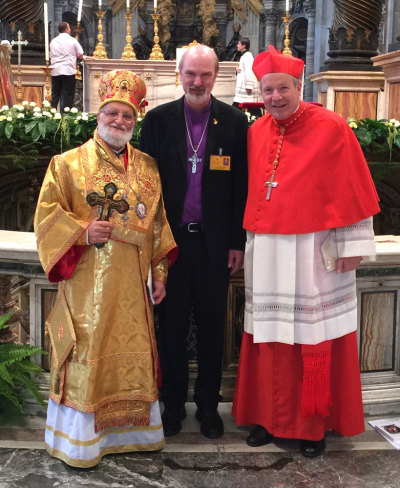A proposal for Catholics and Protestants

In a CP op-ed published on Reformation Day in 2017, I addressed this issue: “The ‘What If’s’ of the Protestant Reformation.” And I put forth this idea:
Rather than going their separate ways, what if the Catholic church and Martin Luther had been able to agree on three foundational points of Christian doctrine:
1. "God so loved the world that He gave His one and only Son, that whoever believes in Him shall not perish but have eternal life." (John 3:16)
2. "Faith without works is dead." (James 2:26) An apple tree produces apples, and Christ produces good works in the life of every believer.
3. Man is justified on the front end of his relationship with God, as evidenced by what Jesus told the thief on the cross who placed his faith in Christ: "I tell you the truth, today you will be with me in Paradise." (Luke 23:43) The thief's faith was alive, and so he was saved, redeemed, born again, justified, and forgiven right there on the spot.
I present this idea once again because these 3 biblical points are critical to understanding the Christian faith. Do you agree with each point, or do you take issue with any of them?
I would like to invite you to do something. If you are a Catholic, I invite you to run these three points by your priest. And if you are a Protestant, I invite you to do the same with your pastor. And let’s see what they say.
If a Catholic priest and a Protestant pastor were to agree with one another on these three points, it would make quite a statement. It would indicate that both the Catholic priest and the Christian pastor are united in the Christian faith, in spite of their ecclesiastical differences.
Many Catholics and Protestants seem to look at one another with a good bit of theological suspicion. There are of course plenty of biblical reasons for this uncertainty. But if you wipe away the preconceived notions and the secondary doctrines, you end up with this simple question: Are Catholics and Protestants essentially brothers and sisters in Christ, or do they represent two different religions?
You probably say, “Well both groups are obviously part of the Christian family of believers.” Fair enough. But if we wanted to test the popular theory that says these two groups are united in the Christian faith, one thing we could do would be to ask everyone involved to evaluate the 3 points listed above.
You see, the Protestant Reformation was largely about one main issue. “How does man become acceptable to God, and thereby receive eternal life in Heaven?”
There are many secondary issues and secondary doctrines we could discuss. But what about the main thing? That is, what about the foundation of the Christian faith?
If Catholic theology and Protestant theology both stand on the Gospel as presented in the New Testament, then what they have in common is far greater than their secondary differences.
But if Catholic priests or Protestant pastors take issue with any of the 3 points listed above, let’s hear it. What are those issues? Is there anything unbiblical in any of those 3 points? If so, please speak up.
For that matter, I wonder what the Pope would have to say about these 3 points. Do you think he could wholeheartedly affirm each point? Why or why not? Maybe someone should ask him.
Catholics and Protestants agree on the critical doctrine of the Trinity. God is Three Persons in One God: the Father, the Son, and the Holy Spirit. Agreed.
But what about the Gospel? What about justification and sanctification? What about the three points listed above? Was the thief on the cross justified, saved, redeemed, born again, and forgiven when he died?
Is every Christian forgiven and justified the moment the Holy Spirit converts their soul through faith in Jesus? Or do you have to add some of your own works in order to be justified before God and forgiven of your sins?
Catholics and Protestants talk a lot about good works. But that common language by itself does not reveal whether the two groups are “joined at the hip.” The key is what both groups have to say about how a person becomes a Christian, and whether or not a person can know for sure that Heaven is his home.
Did Jesus earn forgiveness of sins and eternal life for us when He died for our sins or did Christ only earn part of it? And do we need to earn the rest of it by our actions?
Is eternal life in Heaven really a free gift as revealed in Scripture, or not?
Catholics and Protestants are in agreement that a person who is living for sin is not a Christian. A person who deliberately and consistently makes sin their god is someone who is spiritually lost and on the road to Hell. Agreed.
But is there agreement about John 3:16, and James 2:26, and the thief on the cross? If so, there is much to celebrate. And if not, then it would seem that the Catholic religion and the Protestant faith are not one in spirit and in truth.
Simply present these three questions to your priest, or to your pastor. And if they disagree with any of these three points, please have them explain why. Let’s see what they say, and go from there.
Dan Delzell is the pastor of Redeemer Lutheran Church in Papillion, Nebraska.





















